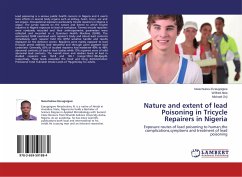
Nature and extent of lead Poisoning in Tricycle Repairers in Nigeria
Exposure routes of lead poisoning to human,the complications,symptoms and treatment of lead poisoning
Versandkostenfrei!
Versandfertig in 6-10 Tagen
27,99 €
inkl. MwSt.

PAYBACK Punkte
14 °P sammeln!
Lead poisoning is a serious public health concern in Nigeria and it exerts toxic effects in several body organs such as kidney, heart, brain, ear and sex organs. Occupational exposure particularly tricycle repairers in Nigeria is vague. The survey reports on the nature and extent to which tricycle repairers in Nigeria exposure to lead at workplace. Twenty tricycle repairers were randomly recruited and their anthropometric parameters were collected and recorded in a Quantum Health Machine (QHM). The automated QHM examined each repairer's body and blood lead contents immediately each repairer he...
Lead poisoning is a serious public health concern in Nigeria and it exerts toxic effects in several body organs such as kidney, heart, brain, ear and sex organs. Occupational exposure particularly tricycle repairers in Nigeria is vague. The survey reports on the nature and extent to which tricycle repairers in Nigeria exposure to lead at workplace. Twenty tricycle repairers were randomly recruited and their anthropometric parameters were collected and recorded in a Quantum Health Machine (QHM). The automated QHM examined each repairer's body and blood lead contents immediately each repairer held the QHM sensitive handle and results displayed on the detector screen. Repairers were mainly exposed to lead through petrol additive lead tetraethyl and through paint pigment lead carbonate. Generally, 85% of studied repairers had moderate 40% to 48% abnormal contents of lead in their bodies while 15% repairers were of mild abnormal lead contents. The overall mean and median levels of lead in studied repairers was 162.8 and 165.1 (range:100.2-196.4)µg/dL respectively. These levels exceeded the Food and Drug Administration Provisional Total Tolerable Intake Levels of 75µg/dL/day for adults.












